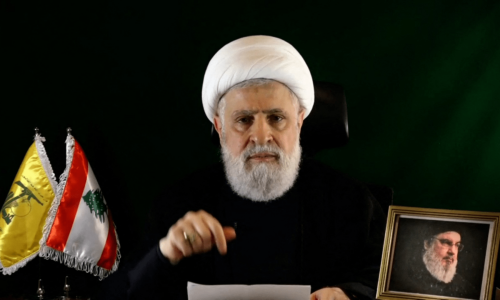Sheikh Naim Qassem, Hezbollah’s deputy secretary general who was elected as the Lebanese armed group’s leader on Tuesday, has been a prominent member of the organization for more than 30 years.
On October 8, Qassem claimed that the conflict between Hezbollah and Israel was a “war” over who cries first, and that Hezbollah would not cry first. He was speaking from an undisclosed location in front of curtains.
Despite Israel’s “painful blows,” the group’s capabilities remained intact. He added, however, that the group backed the efforts of parliament speaker Nabih Berri, a Hezbollah ally, to negotiate a ceasefire. For the first time, the group did not mention a Gaza truce as a requirement for the group to stop firing on Israel.
His 30-minute televised speech came just 11 days after Sayyed Hassan Nasrallah’s death and days after senior Hezbollah figure Hashem Safieddine was thought to have been the target of an Israeli strike.
Hezbollah confirmed Safieddine’s death on October 23.
Abbas al-Musawi, the armed group’s then-secretary general, appointed Qassem as deputy chief in 1991. The following year, an Israeli helicopter attack resulted in his death.
When Nasrallah took over as leader, Qassem continued in his position and has been one of Hezbollah’s most prominent spokespersons for a long time. He has given interviews to foreign media, including during the yearlong cross-border conflict with Israel.
Since the intensification of hostilities between Israel and Hezbollah in September, Qassem gave his second televised address on October 8. He was the first high-ranking leader of Hezbollah to speak on television following Nasrallah’s death on Sept. 27 in an Israeli airstrike on Beirut’s southern suburbs.
On September 30, Qassem stated that Hezbollah would select a replacement for its murdered secretary general “at the earliest opportunity” and would continue to fight Israel in support of the Palestinian people.
In a 19-minute speech, he stated, “What we are doing is the bare minimum… We know that the battle may be long.”
Qassem’s political activism began with the Lebanese Shia Amal Movement, and he was born in Beirut in 1953 to parents from the south of Lebanon.
He left the group in 1979 following Iran’s Islamic Revolution, which influenced many young Lebanese Shia activists’ political thinking.
Qassem participated in meetings that led to the creation of Hezbollah, which was established in 1982 in response to the Israeli invasion of Lebanon with the support of Iran’s Revolutionary Guards.
Since the group first attempted to participate in parliamentary elections in 1992, he has served as the general coordinator of those campaigns.
He wrote a history of Hezbollah in 2005, which was regarded as an uncommon “insider’s look” into the organization. Contrary to Nasrallah and Safieddine, who wore black turbans to indicate their status as descendants of the Holy Prophet (PBUH), Qassem wears a white turban.



